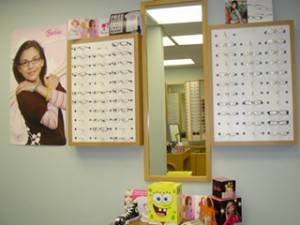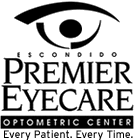Eye Exams for Kids in Escondido & San Marcos, CA
The American Optometric Association (AOA) recommends that children receive a complete vision exam at the ages of six months, three years and five years. A complete evaluation in the summer prior to entry into kindergarten, and yearly evaluations while in school are recommended.
The eye exam before age 1
The American Optometric Association and the California Association of Optometrists recommend that a child should have his/her first eye examination at six months of age. Why? Because your optometrist will examine the eyes for possible signs of amblyopia (lazy eye), crossed-eyes and other focusing problems. Early detection is often critical in preventing vision problems that can have lifelong effects.
The exam at age 3
At age 3, your child's visual acuity and eye health will be assessed. Eye movement skills, focusing and binocular vision skills (the ability of the two eyes to work together as a team) will be evaluated. The eyes will again be checked for warning signs of amblyopia, which is most responsive to treatment if diagnosed by the age of 3.
The exam at age 5
At age 5, your child should be examined to determine the readiness of vision skills for school. An estimated 10% of children have a significant need for eyeglasses to treat nearsightedness, farsightedness or astigmatism. Approximately 15-20% suffer from poor vision skills - focusing, eye alignment or other eye movement skills. These need to be treated to ensure that the child is prepared to do well in school and not be labeled as ADD or as having a learning disability.
Good vision involves many different skills working together to enable your child not only to see clearly but also to understand what he or she sees.
Those skills include:
- Near Vision - Ability to see clearly and comfortably at 13-18 inches, the distance at which school deskwork should be preformed.
- Distance Vision - Ability to see clearly and comfortably at 10 feet or more.
- Binnocular Coordination - Ability to use the two eyes together.
- Eye Movement Skills - Ability to aim the eyes accurately, and move them smoothly across a page and quickly and accurately from one object to another.
- Peripheral Awareness - Ability to be aware of things to the side while looking straight ahead.
- Eye/Hand Coordination - Ability to use the eyes and hands together.
If any of these of other vision skills is lacking or not functioning properly, your child's eyes have to work harder. This can lead to blurred vision, headaches, fatigue and other eyestrain symptoms. Why are thorough vision examinations important? Don't assume your child has good vision because he or she passed a school vision screening. A 20/20 score means only that your child can see at 20 feet what he or she should be able to see at that distance. It does not measure any of the other vision skills needed for learning. Vision screening are important but they should not be a substitute for a thorough vision and eye health examination.
A thorough vision examination is best done by a Developmental Optometrist like Dr. Karen E. Love at Escondido Premier Eyecare Center. She provides pediatric eye exams for children for the surrounding neighborhoods and communities.
The period before school begins is the perfect time to schedule comprehensive eye exams for school-age children. Click on the link below for a helpful checklist for parents, detailing signs and symptoms of pediatric vision problems to watch for.


*Closed daily for lunch between 1pm to 2pm